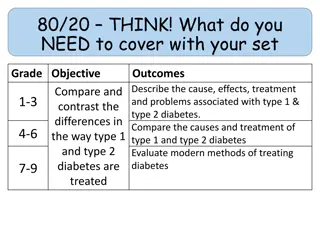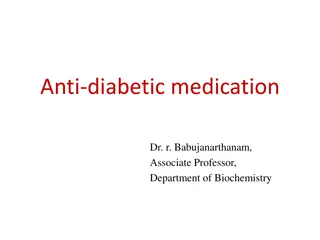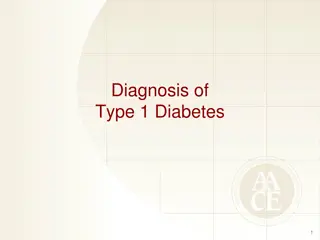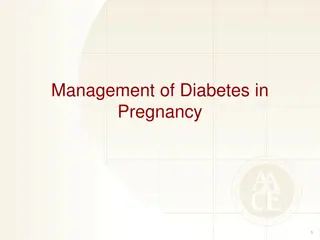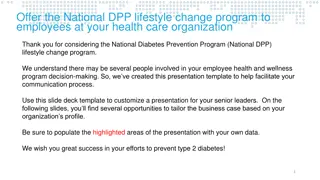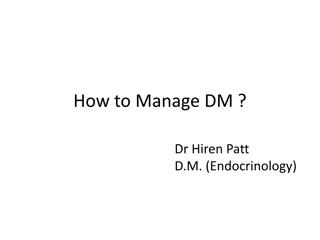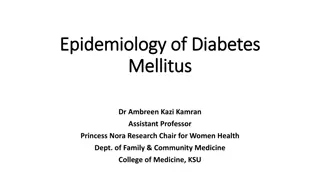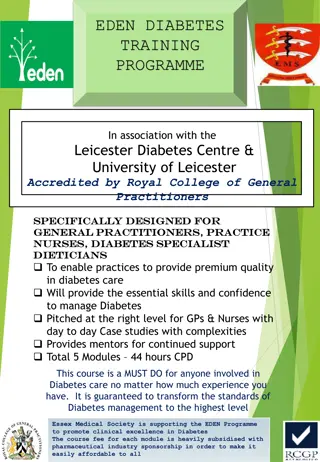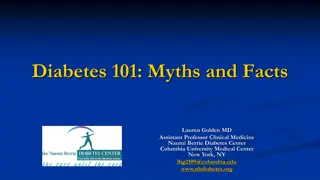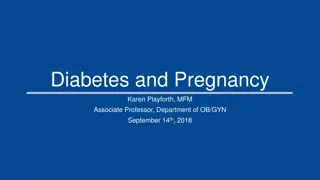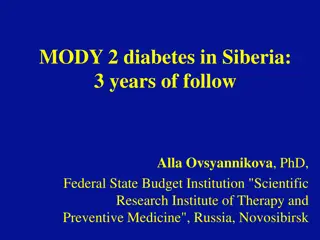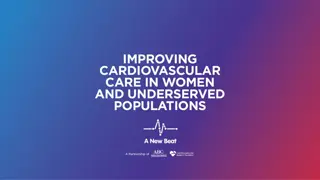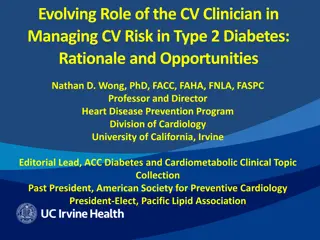Understanding Gestational Diabetes: Risk Factors, Diagnosis, and Management
Gestational diabetes is a condition where high blood sugar levels develop during pregnancy in women without pre-existing diabetes. Risk factors include maternal age, family history of diabetes, ethnicity, and obesity. Diagnostic tests involve measuring blood glucose levels, and management includes a
1 views • 15 slides
Understanding How Diabetes Affects Blood Vessels
Diabetes can harm blood vessels, leading to complications due to high blood sugar levels. Hemoglobin A1c plays a crucial role in monitoring glucose control, with values above 6.5% indicating diabetes. Over time, high blood sugars can damage blood vessels, affecting blood flow and increasing the risk
1 views • 19 slides
Understanding the Relationship Between Mental Health and Diabetes: Insights for Educators
Exploring the link between mental health issues and diabetes, this presentation by Dr. Mary de Groot discusses the implications for diabetes educators. It delves into the prevalence of mental health conditions in people with diabetes, screening, treatment options, and interrelationships between diab
5 views • 45 slides
Preventing and Managing Type 2 Diabetes in Youth
Strategies for preventing and managing type 2 diabetes in youth are discussed in this informative presentation by Dr. Albara Marwa and Taylor Kasoff. Participants will learn about the prevalence, risk factors, prevention strategies, and collaborative management approaches related to pediatric obesit
2 views • 62 slides
Lower Your Patients' Risk of Type 2 Diabetes with CDC's National DPP Lifestyle Change Program
Lower the risk of type 2 diabetes in your patients by implementing the CDC's National Diabetes Prevention Program (National DPP). This evidence-based lifestyle change program focuses on healthy eating and physical activity, helping participants make lasting changes to prevent or delay type 2 diabete
3 views • 11 slides
Understanding Diabetes: Type 1 vs. Type 2, Causes, Treatments, and Modern Methods
Explore the differences between type 1 and type 2 diabetes, including causes, effects, treatments, and associated problems. Compare the causes and treatments of both types of diabetes while evaluating modern methods of treatment. Understand the symptoms, lifestyle factors, and risk factors related t
0 views • 18 slides
Psychiatric Consultation for Diabetes: Enhancing Care at the Intersection of Mental and Physical Health
This presentation by Dr. James K. Rustad explores the critical role of consultation-liaison psychiatrists in managing diabetes along with mental health conditions like schizophrenia. It delves into the prevalence of diabetes, particularly among specific demographic groups, and highlights the complex
0 views • 35 slides
Senior Wellness Presentation: Managing Diabetes Through Exercise
Explore the benefits of exercise in managing diabetes for seniors, including tips on starting an exercise routine and preventing health issues associated with diabetes. Discover how exercise can improve insulin sensitivity and overall well-being for individuals with Type 2 Diabetes. The presentation
0 views • 14 slides
Overview of Anti-Diabetic Medication and Treatment Options
Anti-diabetic medications are used to treat diabetes by lowering glucose levels in the blood. There are various classes of drugs such as insulin, sensitizers, secretagogues, and more, each targeting different aspects of diabetes management. Type 1 diabetes requires insulin injections, while Type 2 d
0 views • 5 slides
Understanding Diabetes: Types, Causes, and Prevention
Diabetes is a disease that affects how the body uses glucose, the main source of fuel. There are two main types of diabetes – Type 1 and Type 2. In Type 1 diabetes, the pancreas fails to produce insulin, while in Type 2, the body's cells do not respond properly to insulin. Uncontrolled diabetes ca
1 views • 14 slides
Classification and Genetic Defects of Diabetes
The diagnosis and differential diagnosis of Type 1 and Type 2 diabetes are discussed, detailing the clinical courses, age of onset, body weight characteristics, onset patterns, and genetic factors. The etiologic classification of diabetes including insulin-deficient, immune-mediated, monogenic, and
0 views • 16 slides
Managing Diabetes in Pregnancy: Preconception and Post-conception Care
Providing preconception care for women with established type 1 or type 2 diabetes is crucial for ensuring a healthy pregnancy. This involves counseling on effective contraception, evaluating and treating diabetes-related complications, reviewing risks of uncontrolled diabetes during pregnancy, and d
0 views • 37 slides
Understanding Diabetes and Its Management in Students
Diabetes is a chronic condition characterized by high blood sugar levels. This article discusses the management and safety of students with diabetes, highlighting the types and classifications of diabetes, differences between Type 1 and Type 2 diabetes, and the presentations of diabetes. It emphasiz
1 views • 42 slides
Priorities and Quality Measures for Type 2 Diabetes Care in NHS GGC
Dr. Kashif Ali leads primary care for Type 2 diabetes, while Dr. James Boyle oversees secondary care in NHS GGC. The data from December 2018 shows the number of Type 2 diabetes patients, their care processes, HbA1c levels, and BMI status. The Diabetes Quality Improvement and Outcome Measures aim to
0 views • 27 slides
Diabetes Coding Strategies for Improved Risk Adjustment
Explore the intricacies of diabetes coding to ensure the highest specificity for risk adjustment capture. Learn about the main ICD-10 categories, HCCs, diabetes diagnosis hierarchy, risk capture review, and more to accurately document diabetes-related conditions for optimal reimbursement under Medic
0 views • 30 slides
Understanding Type 1 Diabetes Pathophysiology and Etiology
Type 1 diabetes is characterized by absolute insulin deficiency, resulting from pancreatic beta cell destruction. It is prone to ketosis with a total deficit of circulating insulin, often due to autoimmune factors. The pathophysiology involves inflammation, immune-mediated cell destruction, and a ch
0 views • 13 slides
Preventing Type 2 Diabetes in the Workplace: The National DPP Program
Offering the National Diabetes Prevention Program (National DPP) lifestyle change program to employees can help reduce healthcare costs, enhance productivity, and prevent type 2 diabetes. The program targets prediabetes, a condition often undiagnosed but with serious implications. By addressing infl
3 views • 12 slides
Nutritional Recommendations for Type 2 Diabetes Management
Regularity and consistency in diet are crucial for individuals with type 2 diabetes to maintain stable blood sugar levels. The new nutritional pyramid recommended by the Ministry of Health of the Republic of Lithuania emphasizes the importance of balanced nutritional choices for managing diabetes. N
0 views • 15 slides
Managing Blood Sugar Levels During Pregnancy and Postpartum
This helpful guide by Dr. Donna D. Johnson provides detailed insights on managing blood sugar levels for women with gestational diabetes mellitus (GDM), type 2 diabetes, and type 1 diabetes during pregnancy and postpartum. It covers medication adjustments, monitoring criteria, and specific recommend
0 views • 8 slides
Understanding Diabetes Mellitus and Dental Plaque
Diabetes mellitus is an endocrine disorder characterized by high blood glucose levels due to insufficient insulin production or ineffectiveness. Type 1 diabetes is insulin-dependent and typically develops in childhood, while Type 2 diabetes is non-insulin dependent and often seen in overweight adult
0 views • 13 slides
Understanding Risk Concepts and Management Strategies in Finance
Explore the essential concepts of risk in finance, such as risk definition, risk profiles, financial exposure, and types of financial risks. Learn about risk vs. reward trade-offs, identifying risk profiles, and tools to control financial risk. Understand the balance between risk and return, and the
0 views • 18 slides
Managing Diabetes: Dr. Hiren Patt’s Expert Advice for Mr. Patel
Dr. Hiren Patt, an Endocrinologist, guides a 24-year-old male named Mr. Patel through tests, diagnosis, and management of diabetes. The consultation covers understanding diabetes types, testing procedures, lifestyle changes, ideal weight recommendations, and dispelling myths about curing diabetes. D
0 views • 29 slides
Overview of Diabetes Mellitus: Types, Diagnosis, and Epidemiology
Diabetes Mellitus is a metabolic disorder characterized by chronic hyperglycemia. It includes Type 1, Type 2, Gestational, Secondary, and Pre-diabetes. Diagnosis involves symptoms like thirst, frequent urination, and weight loss, along with specific glucose tests. Understanding the types, diagnostic
0 views • 30 slides
Diabetes Audit 2017/18 Summary for Cambridgeshire and Peterborough CCG
The 2017/18 National Diabetes Audit for Cambridgeshire and Peterborough CCG reveals that 46,695 people are registered with diabetes in the region, with similar profiles to England. The audit shows disparities in diabetes registrations based on age and deprivation levels, and highlights improvements
0 views • 9 slides
Comprehensive Diabetes Training Programme for Healthcare Professionals
This accredited EDEN Diabetes Training Programme, supported by Essex Medical Society, offers essential skills and confidence to manage diabetes effectively. Specifically designed for GPs, nurses, and dieticians, the course covers a range of modules to elevate healthcare providers' ability in diabete
0 views • 4 slides
Comprehensive Overview of Rush Copley Outpatient Diabetes Center
The Rush Copley Outpatient Diabetes Center, led by Donna Carter RN, CDE, offers a rich history of diabetes treatment, from ancient practices to modern advancements. With a focus on patient education and management, the center serves various diabetes types and provides specialized care, including ins
0 views • 18 slides
Understanding Type 1 Diabetes: Causes, Symptoms, and Treatment
Type 1 diabetes is a condition where the pancreas fails to produce insulin, leading to high blood sugar levels. Without insulin, the body cannot use sugar for energy, resulting in various symptoms like hunger and fat burning. This article provides an overview of diabetes, how insulin works, and the
0 views • 13 slides
Understanding Diabetes: Information for School Personnel
Diabetes is a condition where the body struggles to produce or utilize insulin effectively, leading to high blood sugar levels. This guide provides an overview of diabetes, differences between Type 1 and Type 2, managing diabetes, necessary supplies, and the needs of students with diabetes in a scho
0 views • 11 slides
Debunking Common Myths About Diabetes
Diabetes can't be solely attributed to sugar consumption. Genetics and insulin resistance play significant roles. Understanding the criteria for diagnosing diabetes, pre-diabetes, and the importance of the Hemoglobin A1C test are crucial in managing the condition. This article sheds light on prevale
0 views • 18 slides
Meeting the Challenge of Diabetes in China: Prevalence, Trends, and Geographic Variances
This comprehensive study examines the prevalence, trends, and geographic variances of diabetes in China compared to the United States. With a focus on diabetes and prediabetes rates, the analysis spans over two decades, highlighting the significant burden of the disease in the Chinese population. Th
0 views • 24 slides
Understanding Diabetes-Related Liver Diseases and Their Diagnostic Criteria
Explore the various liver diseases associated with diabetes, such as Glycogenic Hepatopathy, Diabetic Hepatosclerosis, and Hepatogenous Diabetes, along with their etiology, diagnosis, and management. Learn about rare conditions like Glycogenic Hepatopathy characterized by glycogen accumulation and h
0 views • 36 slides
Understanding Canine Diabetes Mellitus: Causes, Symptoms, and Treatment
Canine diabetes mellitus is a common disease in dogs, primarily affecting middle-aged and older dogs. Unlike Type 2 diabetes in humans, dogs mainly experience insulin-dependent Type 1 diabetes. The condition results from beta cell dysfunction in the pancreas, leading to insulin deficiency. Causes in
0 views • 32 slides
Diabetes and Pregnancy: Impact, Complications, and Management
This presentation delves into the potential impact of metabolic syndrome and diabetes on women's reproductive health. It covers topics such as preconception counseling for patients with preexisting diabetes mellitus, complications associated with poorly controlled diabetes in pregnancy, baseline eva
0 views • 31 slides
Understanding MODY Diabetes: Characteristics and Prevalence in Russia
Maturity-Onset Diabetes of the Young (MODY) is a monogenic form of diabetes that often manifests before the age of 25, with distinct clinical features and modes of inheritance. In Siberia, Russia, MODY prevalence and its various subtypes have been a subject of research, shedding light on its unique
0 views • 32 slides
Microvascular Perfusion Loss in Kidneys of Children with Type 1 Diabetes
Dynamic tissue perfusion measurement using PixelFlux reveals microvascular perfusion loss in the kidneys of children with type 1 diabetes. This study examines the impact of diabetes duration, A1C levels, dyslipidemia, and blood pressure on renal microvessel disease. PixelFlux, a color Doppler ultras
0 views • 23 slides
Understanding Compassion Fatigue in Spouses of Type 2 Diabetes Patients
Compassion fatigue, a common phenomenon among spouses of individuals with type 2 diabetes, can impact quality of life and marital satisfaction. India faces a significant burden of diabetes, with a rising number of cases and high associated costs. The country also experiences an alarming trend of you
0 views • 26 slides
Protecting Against Flu: Education for People with Diabetes
Diabetes UK emphasizes the importance of influenza vaccination for individuals with diabetes to reduce the risk of severe complications. In the midst of the unique challenges posed by the 2020 flu season and the ongoing pandemic, efforts were made to increase awareness, encourage early vaccination a
0 views • 13 slides
Insights on Diabetes: Age, Gender, Awareness, and Symptoms
Varied insights on diabetes include age distribution, gender representation, awareness levels, knowledge of diabetes types, personal connections to individuals with diabetes, and familiar symptoms experienced upon diagnosis. The data visualizations provide a comprehensive view of these aspects, shed
0 views • 14 slides
Insights on Cardiometabolic Risk Reduction and Diabetes Treatment in 2019
Cardiologists in 2019 must address the significant cardiovascular risks associated with diabetes mellitus. Dr. Keith C. Ferdinand highlights the increased rates of heart disease, stroke, and heart failure in patients with diabetes. Despite advancements, cardiovascular risk management remains subopti
0 views • 10 slides
The Evolving Role of Cardiovascular Clinicians in Managing Type 2 Diabetes Risk
The role of cardiovascular clinicians in managing cardiovascular risk in patients with type 2 diabetes is evolving, with a growing emphasis on collaboration with multidisciplinary teams. Recognizing the potential benefits of certain diabetes medications on cardiovascular outcomes, clinicians are urg
0 views • 25 slides





